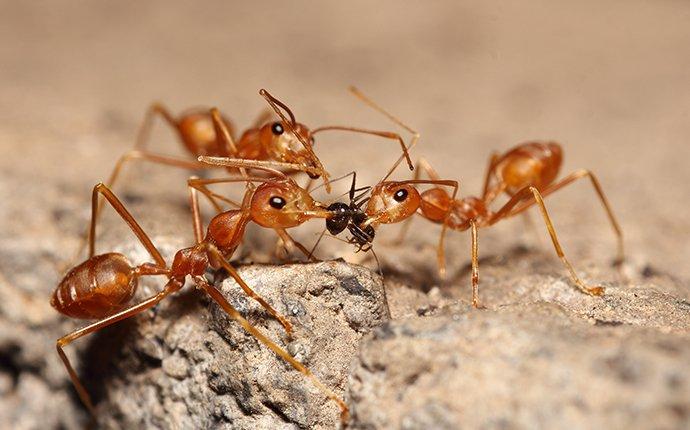Leading Ant Control Services: Reputable Solutions for Your Home or Business
Wiki Article
Environmental Impact of Bug Control: Balancing Performance With Sustainability
The ecological influence of parasite control is an essential issue that needs a delicate equilibrium between accomplishing effectiveness in taking care of pests and making certain sustainability of our ecological communities. From the use of damaging chemicals that leak into our dirt and water to the unintentional effects on non-target varieties, the effects of traditional parasite control techniques are significant.Unsafe Chemicals in Insect Control
The application of harmful chemicals in insect control postures considerable environmental and health and wellness threats that require mindful factor to consider and mitigation strategies. Insecticides, chemicals, and herbicides are generally utilized to eliminate parasites, yet their extensive application can result in unplanned effects. These chemicals can infect soil, water resources, and the air, influencing not just the targeted insects but also advantageous insects, wild animals, and humans.
To address these risks, incorporated insect monitoring (IPM) techniques are being promoted as an extra sustainable alternative. IPM entails a mix of approaches such as biological control, habitat adjustment, and the targeted use chemicals as a last resource (ant control durham nc). By taking on a holistic approach to pest control, we can reduce the environmental and health and wellness influences connected with harmful chemicals while successfully taking care of pest populations
Effect On Non-Target Variety
Taking into consideration the unplanned repercussions of insect control approaches, the influence on non-target species is an essential facet that calls for comprehensive examination. While parasite control procedures aim to target specific parasites, various other organisms in the community might be accidentally affected. Non-target types, including beneficial insects, birds, animals, and even plants, can experience indirect or straight harm from chemical applications or organic control techniques.Insecticides created to fight a specific insect pest may damage pollinators like bees or natural predators such as ladybugs. Biological control representatives, if not species-specific, can posture risks to unintended targets, interfering with the eco-friendly equilibrium.
To mitigate the effect on non-target species, integrated insect management (IPM) methods that stress an alternative technique to pest control are advised. These approaches prioritize the use of eco-friendly practices, minimizing injury to valuable organisms while successfully managing pest populations. Conducting complete threat analyses and keeping track of the outcomes of bug control efforts are crucial steps in guarding non-target types and advertising general ecosystem wellness.
Soil and Water Contamination
Unintended ecological repercussions of parasite control methods expand past impacting non-target varieties, with significant ramifications for soil and water contamination - termite control services. Pesticides, herbicides, and chemical fertilizers used in insect control can leach right into the soil and contaminate groundwater, posturing a threat to both earthbound and water ecosystems.Water contamination is another important concern linked with bug control methods. To minimize soil and water contamination from parasite control activities, integrated insect management techniques that focus on sustainability and reduce chemical inputs are crucial.
Air Pollution From Chemical Use
Exposure to airborne chemicals during agricultural applications positions a substantial issue for air contamination control actions. Additionally, chemical drift, where pesticides are carried by the wind to unexpected locations, can lead to the contamination of close-by ecological communities and water bodies.
Strategies for Sustainable Parasite Control
In the realm of agricultural methods, carrying out lasting pest control techniques is vital for keeping ecological balance why not try these out and protecting plant returns. Lasting parasite control stresses using eco-friendly approaches to manage insect populaces effectively while reducing harm to non-target organisms and ecosystems. Integrated Insect Monitoring (IPM) is a widely adopted method that incorporates organic, social, physical, and chemical control methods to accomplish lasting pest management services.Plant rotation and diversification are additionally reliable strategies to interrupt pest life cycles and create much less desirable problems for insects to thrive. Ultimately, by integrating these lasting parasite control techniques, farmers can accomplish an equilibrium between pest management efficiency and environmental stewardship.
Conclusion
Finally, the ecological effect of parasite control techniques have to be very carefully considered to balance performance with sustainability. Damaging chemicals made use of in insect control can cause soil and water contamination, air pollution, and damage non-target varieties - ant control services. It is critical to execute lasting parasite control techniques to lessen these negative effects on the atmosphere and advertise a much healthier community for future generationsBy taking on a holistic method to pest control, we can lessen the ecological and health and wellness influences associated with unsafe chemicals while efficiently taking care of pest populations.

To mitigate the air contamination caused by chemical use, it is necessary to adopt incorporated pest administration strategies that focus on the usage of non-chemical insect control approaches, such as crop turning, natural predators, and immune crop ranges. Sustainable bug control emphasizes the use of environmentally friendly approaches to handle pest populaces effectively while lessening harm to non-target organisms and ecological communities. Integrated Insect Management (IPM) is a commonly adopted method that incorporates organic, cultural, physical, and chemical control techniques to attain long-term insect monitoring solutions.
Report this wiki page